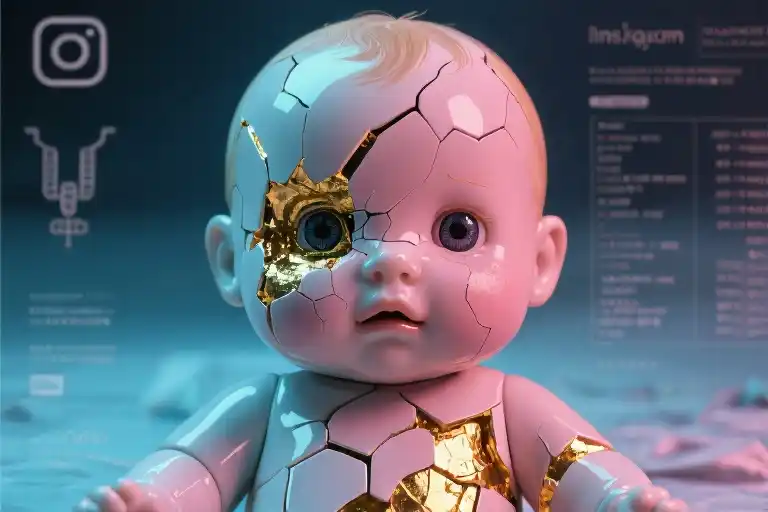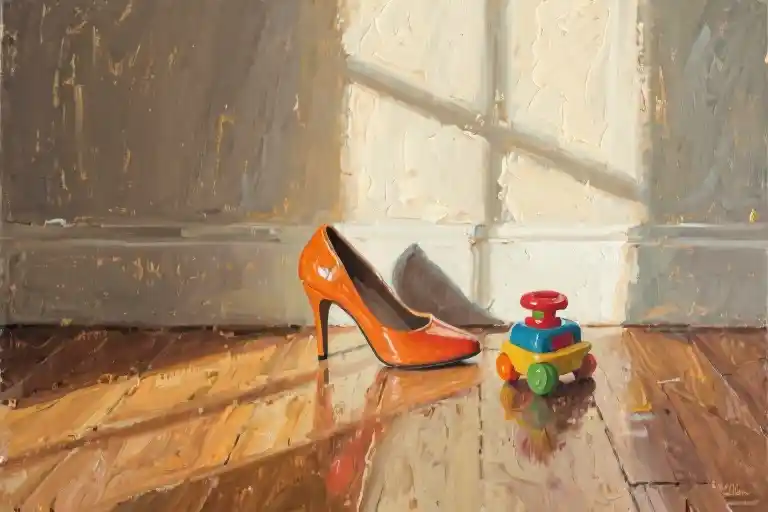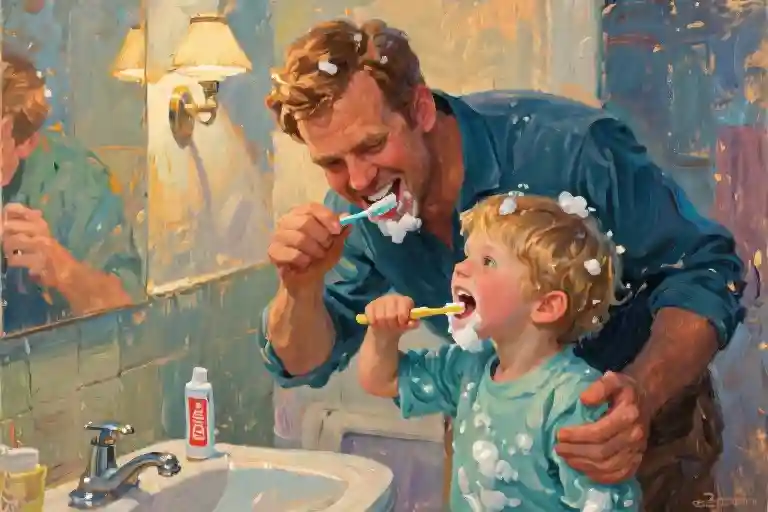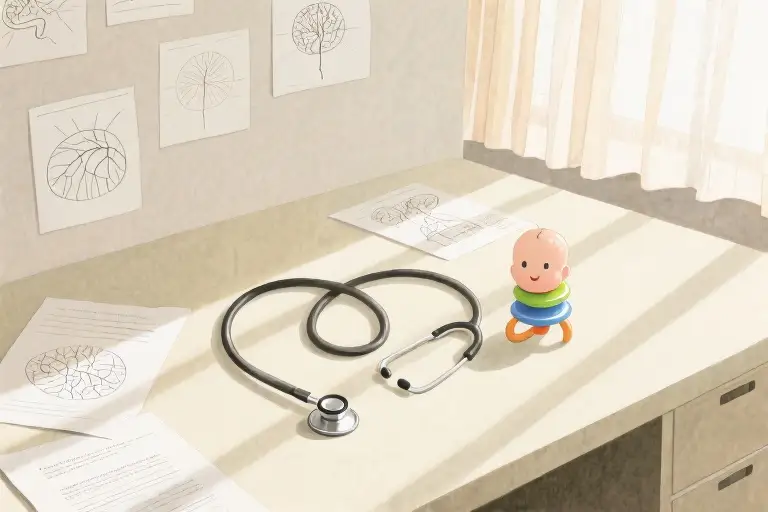The Instagram feed scrolls endlessly, a parade of nostalgic motherhood posts bathed in Valencia-filtered glow. “I miss my baby!” coos a caption beneath a grainy ultrasound photo, while another mom shares a side-by-side comparison of her teenager and his chubby-cheeked infant self with the hashtag #TimeFlies. Meanwhile, my thumb hovers over the like button as I think: I do not miss my baby. Not even a little bit.
This isn’t some tragic admission of maternal failure or a confession of neglect. My toddler currently sleeps down the hall, very much alive and having recently decorated our living room wall with mashed bananas. What I mean is this: when strangers sigh and ask if I miss the baby phase, or when parenting influencers wax poetic about newborn snuggles, my soul makes the same face as when I step on a rogue Lego brick at 3 AM.
Let’s dismantle the industrial birthing complex for a moment—that nebulous alliance between Hallmark-card sentimentality, Pinterest-perfect mommy bloggers, and the multibillion-dollar baby industrial complex that survives by selling us the lie of blissful infancy. They’ve collectively scrubbed the lurid details of early motherhood like a crime scene cleaner removing bloodstains from linoleum.
Babies are objectively terrible roommates. They’re the worst combination of a Vegas headliner (demanding, high-maintenance) and a frat boy (loud, messy, constantly leaking fluids). During my son’s first year, I lost count of how many times I muttered “Christ, you’re being such a baby” to an actual baby—which should tell you everything about the rationality of infants.
What no childbirth class prepares you for is the sheer physiological absurdity of the entire enterprise. Pregnancy isn’t a beautiful miracle; it’s a prolonged science experiment where your body becomes the petri dish. That tiny human isn’t politely requesting nutrients—it’s a calcium vampire draining your bones and teeth with the ruthlessness of a Wall Street hedge fund. Your molars may start wiggling like loose piano keys thanks to relaxin, a hormone that sounds like a margarita special but actually turns your ligaments into overcooked spaghetti. The medical literature casually mentions you “might lose a tooth” with the same nonchalance as noting a Starbucks cup might contain coffee.
Then comes the grand finale: birth. Not the serene waterbirth shown in documentaries, but more like trying to push a cantaloupe through a keyhole while someone shouts “You’re doing great, sweetie!” in the same tone used to encourage dogs at obedience school. Afterwards, you’re handed a creature that resembles a semi-conscious potato and informed it’s your responsibility to keep it alive despite its apparent determination to thwart all survival instincts.
The industrial birthing complex thrives on this information asymmetry. They’ll sell you $800 cribs and organic cotton onesies, but nobody markets the reality that your postpartum body will feel like a deflated bounce house crossed with a pinata that’s been hit too hard. At your six-week checkup (the only medical acknowledgment that you’ve been through a major physical trauma), the doctor essentially checks if you’re actively hemorrhaging or contemplating vehicular homicide before clearing you for sex and exercise—because nothing says “you’re healed” like being told to do kegels and please your husband.
Meanwhile, your newborn enters the fourth trimester—a charming euphemism meaning “still technically undercooked.” For three months, this tiny CEO demands 24/7 attention while offering zero performance reviews beyond varying volumes of screaming. Breastfeeding, that sacred bonding experience, feels less like nurturing and more like having your nipples used as chew toys by a rabid squirrel. Mastitis—an infection that turns your breasts into fiery boulders of pain—should be featured in anti-natalism propaganda alongside climate change reports.
Do I sound bitter? Good. Someone needs to counterbalance the pastel-colored lies. Because here’s what they don’t show in the maternity ward brochures: at 2 AM, when you’re rocking a wide-awake infant for the ninety-third minute, staring into their unblinking eyes like a hostage negotiator, you’ll understand why sleep deprivation is an actual torture technique. The CDC’s SIDS prevention guidelines will have you monitoring your baby’s breathing like a nuclear reactor technician, convinced that one misplaced blanket could trigger armageddon.
Yet somehow, through the sleepless nights and cracked nipples and identity erosion, we survive. Not because of some mythical maternal instinct, but because evolution made babies cute enough to override our better judgment. My son could projectile vomit directly into my open mouth and still somehow look adorable doing it—a biological safeguard ensuring our species’ continuation.
So no, I don’t miss my baby. Not when the toddler version sleeps through the night (mostly) and finally understands that books aren’t snacks (usually). But this isn’t a rejection of motherhood—it’s a rejection of the fairy tale version we’ve been sold. The truth is messier, funnier, and infinitely more interesting. And if that makes me a bad mom by Instagram standards, well… my teeth are already loose anyway.
The Bodily Horrors of Pregnancy
Pregnancy is often portrayed as a glowing, magical time when a woman blossoms with life. The reality? It’s more like hosting a tiny, demanding parasite that rewires your entire biology without consent. Let’s start with the calcium heist – your growing baby will leach this mineral from your bones and teeth if dietary intake falls short. That slight chip in your front tooth isn’t clumsiness; it’s your skeleton literally paying the baby tax.
Then comes relaxin, the hormonal saboteur. This pregnancy hormone loosens ligaments to accommodate childbirth, but it doesn’t discriminate between your hips and your teeth. Imagine brushing your teeth one morning and feeling them wiggle like loose piano keys. Medical literature casually mentions “some tooth mobility” as if we’re discussing slightly overripe avocados rather than the potential loss of adult teeth. The first time I spit blood into the sink, I genuinely wondered if I’d signed up for pregnancy or some medieval torture experiment.
Your feet aren’t safe either. That extra shoe size isn’t temporary swelling – it’s permanent bone restructuring. Say goodbye to your favorite heels and hello to orthopedic inserts. Meanwhile, your abdominal muscles separate like a failed zipper (diastasis recti for the medical jargon lovers), creating that “mom pooch” that stubbornly outlasts even the most aggressive postpartum workouts.
Let’s discuss the hemorrhoids. Those Preparation H commercials from your childhood suddenly make tragic sense when you’re icing your backside at 3am. Add in the urinary incontinence that makes trampolines your mortal enemy, and the increased stroke risk that nobody mentions at baby showers (carbon monoxide gets all the PR as the silent killer).
The real kicker? All these changes occur while society expects you to radiate maternal joy. There’s no Hallmark card for “Congratulations on your brittle bones and loose teeth!” The industrial birthing complex wants you focused on nursery themes and stroller specs, not the fact that your body becomes a science experiment gone wrong.
Yet somehow, we’re supposed to miss this phase? The only thing I miss is my pre-pregnancy dental stability.
The Great Medical Betrayal
The moment your newborn is placed on your chest, you’ll notice two things simultaneously: the surreal wave of oxytocin flooding your system, and the medical team’s abrupt shift in attention. Nurses who spent hours coaching your breathing now briskly stitch you up while discussing their lunch plans. The monitors that tracked every contraction suddenly go silent. You’ve served your biological purpose – congratulations, you’re now a background character in your own story.
Postpartum care operates on what I call the Goodfellas Principle. Remember that iconic scene where mobster Paulie abruptly stops returning Henry Hill’s calls? Maternal healthcare follows the same script. At your six-week checkup – the sole postpartum assessment for most women – the questionnaire reads like a depression screening from a corporate HR portal:
Are you bleeding abnormally?
Have you thought about harming yourself or others?
Check ‘no’ to both and you’re handed a metaphorical gold watch. The obstetrician’s discharge instructions might as well be copied from a 1950s marital guide: resume intercourse (your husband’s needs matter again!), start exercising (that baby weight won’t shame itself away), and for god’s sake try to look less tired. Then poof – the medical establishment turns its back. You’re left with stitches in places you didn’t know could tear, breasts that have become public utilities, and a pelvis that feels like a Jenga tower after an earthquake.
What makes this institutional abandonment particularly grotesque is the contrast with your baby’s healthcare schedule. That same six-week period where you get exactly one 15-minute appointment? Your infant will have seen pediatricians five times, with each visit meticulously tracking percentiles and reflexes. Society’s message couldn’t be clearer: the product matters more than the production facility.
The identity erasure happens gradually, then suddenly. Hospital bracelets get replaced with mommy-and-me class schedules. Colleagues who once knew your work achievements now ask exclusively about sleep schedules. Even service representatives adopt that infuriating singsong tone – And what does Mama think about this insurance plan? Your name, career, and personal preferences dissolve into the cultural archetype of Mother.
Here’s what they don’t prepare you for: medical gaslighting wears many disguises. When you report leaking urine six months postpartum, they call it common. When your back pain persists, it’s normal. That abdominal separation making you look perpetually pregnant? Just how some women heal. The subtext always whispers: your suffering is unremarkable, expected, unworthy of intervention.
Perhaps the cruelest joke is how we pathologize women’s reactions to this systemic neglect. The same medical establishment that provides minimal postpartum support then profits from treating postpartum depression – as if despair were some hormonal fluke rather than the logical response to being treated like a spent incubator.
This isn’t just about healthcare – it’s about how we value women’s bodies. We’ll pay thousands for fertility treatments to create babies, but balk at covering pelvic floor therapy after birth. We celebrate pregnancy as a public event, then shame mothers for letting themselves go. The math is simple: once your womb becomes unoccupied real estate, society stops calculating your worth.
So no, I don’t miss those early days. Not the phantom kicks, not the midnight feedings, certainly not the way my medical records abruptly switched from patient to vessel. But what I miss least of all is the collective pretense that any of this is somehow noble rather than negligent.
The Newborn Survival Manual
Breastfeeding hits you like a poorly written Yelp review: all the hype promised a natural, beautiful bonding experience, but the reality involves cracked nipples, unsolicited advice, and a sneaking suspicion you’re doing it all wrong. Those lactation consultants who made it look effortless? They’re the culinary school graduates who claim you can julienne carrots while blindfolded.
Let’s start with the nipple damage. No one adequately prepares you for the sensation of a tiny piranha latching onto what feels like an open wound. The first two weeks transform your chest into a war zone – scabs form, peel off during feeds, then reform like some grotesque Groundhog Day scenario. Google searches escalate from “normal breastfeeding pain?” to “can nipples actually detach?” (Spoiler: They can’t, but the fact you needed to ask tells you everything.)
Then comes mastitis, nature’s cruel joke on sleep-deprived mothers. One minute you’re admiring your baby’s eyelashes, the next you’re shivering with fever while your left breast impersonates a volcanic rock. The medical advice? “Just keep nursing!” As if wrestling a hangry gremlin onto your infected flesh sounds remotely appealing. Pro tip: Cabbage leaves in your bra aren’t just an old wives’ tale – something about the coolness and anti-inflammatory properties actually helps. Who knew your salad spinner would double as medical equipment?
The sleep deprivation deserves its own circle of hell. Newborns operate on a sinister algorithm: the moment your head touches the pillow, their internal alarm blares. Those “sleep when the baby sleeps” platitudes? Impossible when your adrenaline still spikes at every grunt. By 3am, you’ll find yourself having profound existential debates with the diaper pail. “If a baby cries in an empty house, does it make a sound?” you ponder while microwaving yesterday’s coffee.
SIDS anxiety transforms you into a paranoid scientist. You’ll develop elaborate theories about optimal room temperature (68°F exactly), become a swaddle origami master, and stare at the baby monitor like it’s broadcasting the season finale of your life. That nursery rhyme about “if they’re hot, they die” plays on loop in your brain. You start side-eyeing grandparents who dare suggest “just one blanket.”
The survival rules read like a dystopian novel:
- Back to sleep (but also do tummy time)
- No blankets (but prevent hypothermia)
- Breast is best (but don’t you dare leak in public)
- Cherish every moment (while operating on 90-minute sleep cycles)
Here’s the secret veteran moms know: nobody actually follows all the guidelines perfectly. That AAP handbook? More like aspirational fiction. You’ll eventually develop your own algorithm based on which risks scare you most that particular week.
What gets lost in all the terror is the dark comedy of it all. There’s something perversely funny about realizing your PhD means nothing when faced with a screaming potato who hates all five brands of bottles you bought. Or discovering that “sleeping through the night” actually means one 4-hour stretch – a phrase clearly invented by someone marketing sleep aids.
The survival manual no one gives you at the hospital should just say: “Lower your standards, trust your gut, and for god’s sake stop Googling at 2am.” That, and stock up on nipple cream.
The Myth of Maternal Instinct and the Industrial Birthing Complex
The cultural machinery working to sustain the motherhood myth operates with startling efficiency. What I’ve come to call the Industrial Birthing Complex – that unholy alliance between conservative think tanks, social media momfluencers, and the multi-billion dollar baby industry – functions like a well-oiled propaganda machine. Their product? The lie that women are biologically wired to cherish every moment of infant care.
Evolution played a cruel trick by making babies objectively cute. Those chubby cheeks and gummy smiles aren’t accidents; they’re sophisticated survival mechanisms. Prehistoric infants who failed to trigger oxytocin releases in sleep-deprived caregivers probably became saber-tooth tiger appetizers. Modern capitalism simply weaponized this biological programming.
Scroll through any parenting forum and you’ll find the Complex’s handiwork. The Heritage Foundation publishes studies about declining birth rates while Mormon mommy bloggers perform choreographed dances about #blessed motherhood. TikTok algorithms boost videos of giggling newborns while suppressing clips of mothers sobbing in shower stalls. The message is consistent: your resistance to enjoying baby vomit and cracked nipples is unnatural.
This conditioning begins early. Little girls receive baby dolls that coo contentedly when fed, never simulating colic or projectile diarrhea. Teen pregnancy prevention programs show graphic birth videos but skip the footage of fourth-degree tears or postpartum anxiety. Even medical professionals participate – how many obstetricians adequately warn patients about the high probability of peeing while sneezing for the rest of their lives?
The Complex’s most insidious achievement is transforming normal maternal ambivalence into shame. When a mother admits she doesn’t miss the baby phase, she’s violating the sacred script. Our culture can accommodate complaints about toddlers (the ‘terrible twos’ are practically celebrated), but expressing anything but reverence for infants marks you as defective.
This explains the shocked reactions when I say I don’t miss my baby. People’s faces contort as if I’ve confessed to hating rainbows. The unspoken accusation: if you truly loved your child, you’d romanticize those sleepless nights. But love isn’t measured in nostalgia for difficult phases. I can adore my son while being profoundly grateful we’ve moved past the stage where his survival depended on my body’s systematic destruction.
Which brings us to society’s most baffling phenomenon: the second child pressure. Complete strangers feel entitled to ask when you’ll ‘give’ your child a sibling, as if reproducing were equivalent to buying matching stuffed animals. These interrogations inevitably come from two camps: elderly relatives who’ve forgotten what infants require, and smug parents of multiples who’ve succumbed to Stockholm syndrome.
The Complex depends on women forgetting. Evolution helps by flooding new mothers with hormones that blur traumatic memories (nature’s version of date rape drugs). Social pressures complete the work – we’re expected to narrate our motherhood experiences as uplifting journeys rather than the hazing rituals they often resemble. No wonder so many women find themselves back in the delivery room, chasing the oxytocin high while their pelvic floors whisper warnings in vain.
There’s liberation in rejecting these scripts. When we stop performing gratitude for experiences that objectively suck, we make space for more honest conversations about parenting. Maybe then we can redirect energy from sustaining myths to building systems that actually support mothers – starting with paid leave policies longer than a common cold’s duration.
The Biological Conspiracy of Baby Cuteness
Let’s get one thing straight—I’m not a monster. When I say I don’t miss the baby phase, it’s not because my child lacked the evolutionary cheat code that makes human infants irresistible. That squishy face, those gummy smiles, the way their tiny fingers curl around yours like they’re trying to imprint on your soul—it’s all biologically weaponized charm. Prehistoric babies would’ve been saber-tooth tiger snacks without it. My son, despite his nocturnal terrorist tendencies and a breastfeeding style reminiscent of a piranha, could melt glaciers with his dimples.
But here’s the dirty little secret no one mentions: that cuteness is nature’s sleight of hand. It’s the glitter sprinkled over a sleep-deprivation torture chamber to keep you from abandoning your post. Scientists call it kindchenschema—the specific combo of big eyes, round cheeks, and disproportionate features that hijacks your brain’s reward system. It’s why you’ll find yourself cooing over a creature that just projectile-vomited into your favorite bra while simultaneously forgetting your own name.
The Love Equation (That No One Balances)
Society loves to conflate missing with loving. As if nostalgia were the only valid proof of devotion. But love isn’t measured in wistful Instagram captions—it’s in the trenches. Changing the fifth diaper of the hour at 3 a.m. while humming Baby Shark through clenched teeth. Enduring mastitis fevers that make your breasts feel like they’ve been replaced by lava-filled sandbags. Smiling through a toddler’s public tantrum because you now understand that I hate you actually means I’m overwhelmed and you’re my safe place.
The truth is, I adore my child more deeply now that he’s graduated from a sleep-deprived potato to a tiny philosopher who asks why the moon follows us home. But love doesn’t require rose-tinted amnesia. I can cherish baby photos while being profoundly grateful that phase is over, like surviving a shipwreck and keeping the souvenir mug.
A Call for Radical Honesty
To the moms whispering me too when I say I don’t miss the baby stage: your honesty is revolutionary. In a world where motherhood is still packaged as a pastel-colored sacrifice marathon, admitting the grind is an act of defiance.
And to the women still deciding whether to have kids? You deserve more than fairy tales and fearmongering. The full picture includes both the magic and the mundane horrors—the way your heart will explode the first time they laugh, but also the way your pelvic floor might never recover.
So no, I don’t miss my baby. But I’ll fight anyone who claims that makes me less of a mother. Now if you’ll excuse me, my toddler just tried to ‘help’ by washing the cat in my coffee maker—and somehow, this is still easier than the fourth trimester.





